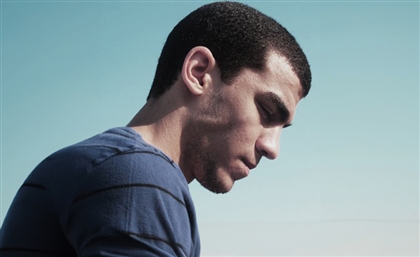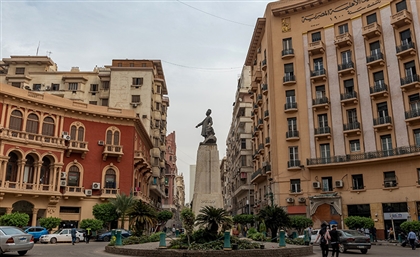Creating a Moment of Utopia with Pascal Rambert
The creation of raw theatre through the simple tactic of people watching, Pascal Rambert divulges his secrets on how to keep his creations alive, ahead of tonight’s debut of ‘A Micro History of World Economics, Danced’ which opens up D-CAF.
Rarely do we witness real and pure passion but seek Pascal Rambert and you’ll find it, "I work for Utopia," he says in his heavy French accent. A chameleon when it comes to the arts world, he is a director, writer, choreographer, traveler and so much more; his ever-adapting personality has picked up skill after skill. Since 2007, Rambert has been the director of Théâtre de Gennevilliers, a platform which was to act as his inspiration for the performance A (Micro) History of World Economics, Danced. This performance has travelled with him to major cities from Tokyo to New York and now it’s landed in Cairo.
Don't be fooled by the title and expect an Intro to Microeconomics 101 lecture; the one hour and 25 minute performance encompasses more than economic theories. Expecting to talk to a man who would speak in numbers, we instead got philosophy from an artist who created such a prominent piece of work on something he knew little about. "I wasn’t really good at economics but I was pissed off to see my future held up by it, so we looked closely… Day after day I worked closely with a friend and we started to create the show," he explains. That man was economist Eric Méchoulan of the University of Montreal, and together with Rambert they sought to show case the history of the economy and its effect on a group's daily life after seeing the burden it created on the town of Gennevilliers. "I listened to their struggles…people struggling," he says wistfully.
He walks amongst the Egyptian performers during their warm up before the final rehearsals at Cairo GrEEk Campus, blending in with them, which is evidence to his success in bringing variety amongst his performers. 50 performers chosen at random from different age groups and background brings the performance to home, wherever home may be.

Indeed Pascal Rambert's work travels far and wide, even travelling without him as tens of concurrent perfomances are currently taking place around the world. So who is the man behind the performance of A (Micro) History of World Economics, Danced? At first glance you can tell that he is very much comfortable in his own skin with his short, to the point sentences, oozing charisma as he chats away about theatre, love and travel, "I have worked in every single part of the world…Japan…Russia…everywhere.” Having delved into the ever changing art world, Rambert worked since the young age of 16, "I am now 52," he says proudly as he certainly doesn’t not look it.
With the bombardment of Sobky movies, flooding Egypt’s commercial arts scene, it is refreshing to think about theatre, a world with constant innovation, though we still find ourselves glued to screens. One wonders when the sentence, "wanna go to the movies?" will be replaced with, "wanna go to the theatre?" Rambert sums up his emersion in theatre in one sentence: “I do theatre because I love people…if you want to do theatre it is better to love people." Sometimes, especially with the pressure of carrying your performances with you and having a worldwide audience, your work might be marginalised but Rambert insists that you should take yourself out of your comfort zone, "you need to mix things up a lot."

His work incorporates real individuals which is what makes him take on 50 amateurs for each city he puts on the show in, making each performance different, raw and edgy. And what better way to get the message across than through messengers from the audience’s own neighborhood, a method that has already worked for him in major cities? To your average textbook director who works as a puppet master, it would seem risky having these 50 performers and not being able to mould them to your will. But for Rambert, it is the contrary he seeks; "I love natural movement, for the body not to be trained.”
"I love watching people," continues Rambert and Cairo is a perfect place to do just that. "I love Egypt… I could live in Cairo…I love it!" Hearing someone say that gave a refreshing glance at a city that has been overwhelmed with hefty politics. And if you really think about it Cairo is quite a looker. "I don’t go sit in the fancy places when I'm in Egypt. I sit in baladi cafés watching… Upon that I start to do my art." With people as his inspiration Rambert very much expresses his love for the human body in all its different shapes.
Being dependent on these 50 performers to incorporate his different ideas must be a tad risky but Rambert swiftly and confidently replies, "I never worry. Even in Egypt with all the ma3lesh and ba3d bokra… I never worry!" Indeed he didn’t need to worry, because as soon the rehearsals started, the performers seemed to grasp his ideas and vision, bringing his concept to life whilst still maintaining their own individuality. It was most interesting to see your average Moe and people you may walk past on the street never expecting that they would be rushing to catch theatre rehearsals at night. One elderly woman had eagerly shouts “yalla ba2a (let’s go)!” and with that the lights came on, the performers awaited their cues and a pleased Pascal Rambert looked filled with pride, watching on the steps of the GrEEK Campus.
You can catch A (Micro) History of World Economics, Danced at the GrEEK Campus on Thursday 19 March at 08:00PM and Friday 20th March at the same time.
Photography by Mahmoud Asfour.
- Previous Article Ancient Egypt's Extortionate Taxes
- Next Article Habib El-Adly to Be a Free Man Within Days
























